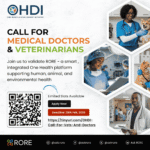Enhancing Animal Welfare for One Health: A Crucial Imperative

Animal welfare is a fundamental component of the holistic concept known as One Health, which recognizes the interconnectedness of human, animal, and environmental health. It emphasizes the intricate relationships between these elements and underscores the importance of addressing health challenges collaboratively. In this article, we explore the significance of animal welfare within the framework of One Health and highlight the synergistic benefits it offers for both animal and human well-being.
Understanding Animal Welfare:
Animal welfare refers to the state of an animal’s physical, mental, and emotional well-being. It encompasses various factors, including access to adequate nutrition, appropriate shelter, healthcare, and opportunities for natural behavior. Ensuring high standards of animal welfare not only promotes ethical treatment but also contributes to overall health outcomes.
The Link to One Health:
The concept of One Health recognizes that the health of humans, animals, and ecosystems are interconnected. Animals serve as reservoirs for pathogens that can transmit to humans, leading to zoonotic diseases. By prioritizing animal welfare, we can mitigate the risk of disease transmission and safeguard public health. Additionally, healthy animals are more resilient to infections, reducing the spread of diseases within animal populations and minimizing the need for antimicrobial interventions.
Benefits of Prioritizing Animal Welfare:
- Disease Prevention: Proper husbandry practices, such as vaccination, sanitation, and biosecurity measures, help prevent the spread of infectious diseases among animals and reduce the risk of zoonotic transmission.
- Sustainable Food Production: Ethical treatment of farm animals not only improves their quality of life but also enhances productivity and ensures the safety and quality of food products for consumers.
- Conservation Efforts: Protecting the welfare of wildlife species is essential for biodiversity conservation. By preserving natural habitats and implementing conservation strategies, we can safeguard ecosystems and mitigate the loss of biodiversity.
- Social and Economic Development: Supporting animal welfare initiatives fosters sustainable livelihoods for communities reliant on livestock and agriculture. It promotes responsible stewardship of natural resources and encourages economic growth in rural areas.
Case Studies and References:
- Preventing Zoonotic Diseases: The outbreak of the H1N1 influenza virus in 2009 highlighted the importance of monitoring animal health and implementing preventive measures. Researchers have demonstrated the effectiveness of vaccination campaigns in reducing the transmission of zoonotic pathogens from animals to humans (Smith et al., 2012).
- Improving Animal Welfare in Agriculture: The implementation of animal welfare standards in livestock farming has been shown to enhance productivity and consumer confidence. Studies have indicated that providing enriched environments for animals can reduce stress levels and improve meat quality (Blokhuis et al., 2010).
- Conservation Initiatives: Conservation programs focused on protecting endangered species have yielded positive results in restoring populations and preserving habitats. The integration of community-based approaches with wildlife conservation efforts has been successful in promoting sustainable coexistence between humans and wildlife (Jacobson et al., 2016).
Conclusion:
Promoting animal welfare is not only a moral imperative but also a strategic investment in public health, environmental sustainability, and social well-being. By recognizing the interconnectedness of human, animal, and ecosystem health, we can foster collaborative efforts to address global health challenges effectively. Upholding high standards of animal welfare is essential for achieving the overarching goals of One Health and building a resilient future for all species on our planet.
References:
Blokhuis, H. J., Veissier, I., Miele, Mara and Jones, B. 2010. The Welfare Quality® project and beyond: safeguarding farm animal well-being. Acta Agriculturae Scandinavica, Section A – Animal Science 60 (3) , pp. 129-140.
Jacobson, S. K., McDuff, M. D., & Monroe, M. C. (2016). Conservation education and outreach techniques. Oxford University Press.
Smith, G. J., Vijaykrishna, D., Bahl, J., Lycett, S. J., Worobey, M., Pybus, O. G., … & Grenfell, B. T. (2009). Origins and evolutionary genomics of the 2009 swine-origin H1N1 influenza A epidemic. Nature, 459(7250), 1122-1125.

Mohamed Yahya
Mohamed Yahya is currently pursuing his third professional year in the Bachelor of Veterinary Science and Animal Husbandry (B.V.Sc & A.H) program at Madras Veterinary College, part of the Tamil Nadu Veterinary and Animal Sciences University (TANUVAS), India. He is deeply passionate about One Health and disease prevention, dedicated to integrating veterinary and human health for a comprehensive approach to public health challenges.





